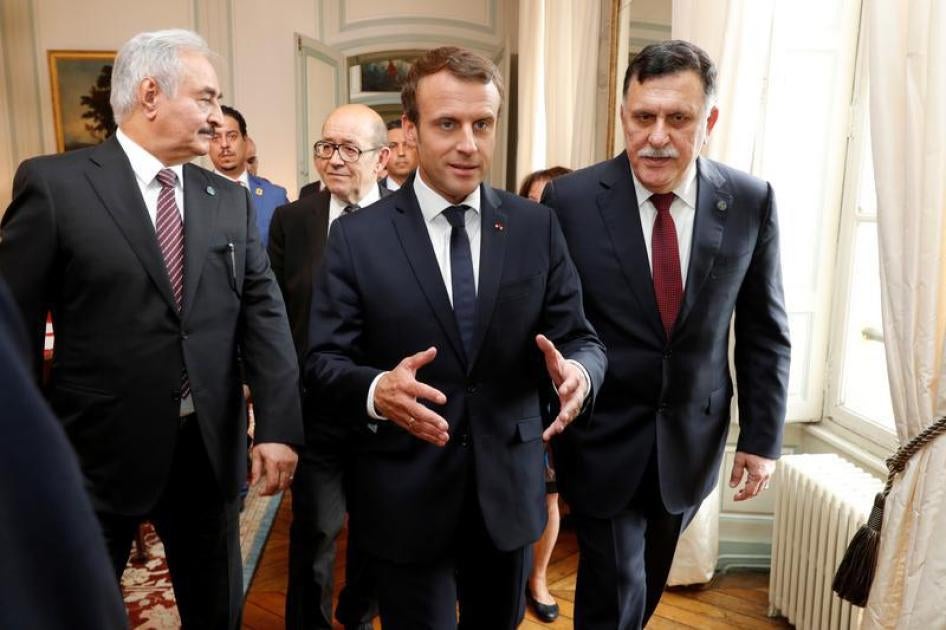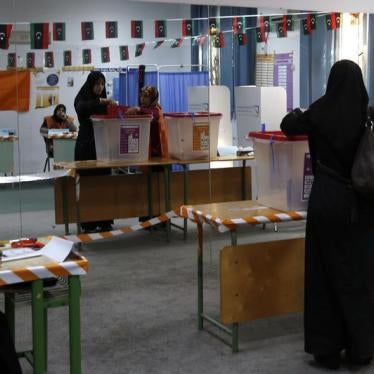(Paris, May 29, 2018) – French President Emmanuel Macron should ensure that four Libyan leaders meeting in Paris on May 29, 2018, pledge to improve human rights and ensure conditions conducive for a free and fair vote ahead of any planned elections, Human Rights Watch said today.
The new French initiative is the second attempt by Macron to reach consensus among some key figures in Libya. It builds on a July 2017 meeting that led to no discernible results between General Khalifa Hiftar, commander of the Libyan National Army forces (LNA), and Fayez Serraj, prime minister of the rival Tripoli-based, internationally recognized Government of National Accord (GNA). In the meantime, armed groups commit abuses with no fear of being held accountable, while protracted armed conflicts and political divisions have decimated the economy and caused a human rights and humanitarian crisis.
“President Macron should make clear that the pretext of political negotiations will not cause France to turn a blind eye to the responsibility of political leaders for the deplorable human rights conditions in Libya,” said Bénédicte Jeannerod, France director at Human Rights Watch. “The international community, but most of all Libyans, need to hear Libyan leaders pledge significant improvements to the rule of law, justice, and accountability – including for their own abusive forces – before organizing elections.”
At minimum, Libyan authorities should pledge to ensure conditions in which candidates can campaign freely without undue risk of attacks, an independent audit of the voter registry, secure polling places in areas under their control, and sufficient court security to allow adjudication of disputes, Human Rights Watch said.
Human Rights Watch has a reviewed a copy of the draft accord to be negotiated at the summit. The 13-point accord includes commitments to hold elections in 2018 and respect the results, and an understanding that the international community would impose sanctions on spoilers. It makes no mention of the human rights obligations of the parties and no commitment to hold elections in conditions that will ensure that they are free, fair, and credible.
In addition to Hiftar and Serraj, media reports say, Macron extended invitations to Khalid Al-Meshri, head of the Supreme State Council, a consultative body for the GNA, and Aqila Saleh, the speaker of the House of Representatives, which, along with Hiftar, is allied with the GNA’s competitor, the Al-Bayda-based Interim Government.
The United Nations has publicly supported holding general elections in Libya in 2018. But the special representative of the secretary general in Libya, Ghassan Salame, said in his May update to the Security Council that to hold elections “proper conditions must be in place. A new round of voter registration, prior commitment to accept the results, appropriate funds, and strong security arrangements are needed.”
The legal framework for holding elections remains opaque. The House of Representatives has yet to pass a new elections law, and a draft constitution proposed by the Constitution Drafting Assembly in July 2017 has yet to be put to a national referendum. The High National Elections Commission, the body responsible for holding elections, has yet to clarify the legal framework for participation by political parties, and how it plans to ensure the presence and security of independent and international monitors where voting is planned.
Armed groups throughout the country, some of them affiliated with the competing governments, extra-judicially execute people; attack civilians and civilian infrastructure, including healthcare structures; and abduct and disappear people. Migrants and asylum seekers who pass through Libya risk beatings, extortion, sexual violence, and forced labor in unofficial facilities and detention centers nominally under the state, at the hands of guards, militias, and smugglers.
The extremist group Islamic State (also known as ISIS) claimed responsibility for an armed attack on May 2, against the election commission headquarters in Tripoli that resulted in 14 deaths, most of them of civilians. On May 25, an unidentified group carried out a suicide attack in Benghazi, killing seven people and injuring 10, mostly civilians.
For elections to be free and fair, they need to be held in an environment free of coercion, discrimination, or intimidation of voters, candidates, and political parties, Human Rights Watch said. Instead, restrictive laws have undermined freedom of speech and association in Libya, and armed groups have attacked and intimidated journalists and other media professionals. Libyan authorities need to guarantee free speech and assembly by addressing these restrictive laws and punishing armed groups carrying out unlawful attacks.
Authorities also need to ensure the basic rule of law, accompanied by a functioning impartial and independent judiciary that is able to fairly and promptly resolve disputes around campaigns and voting.








